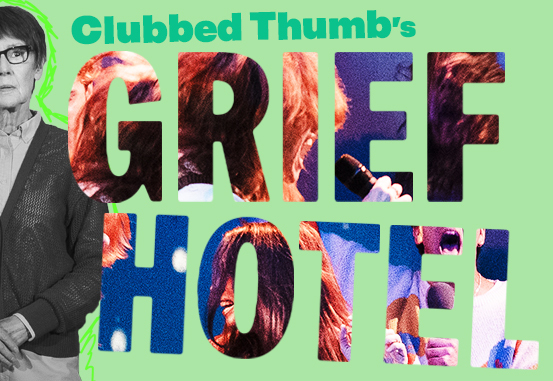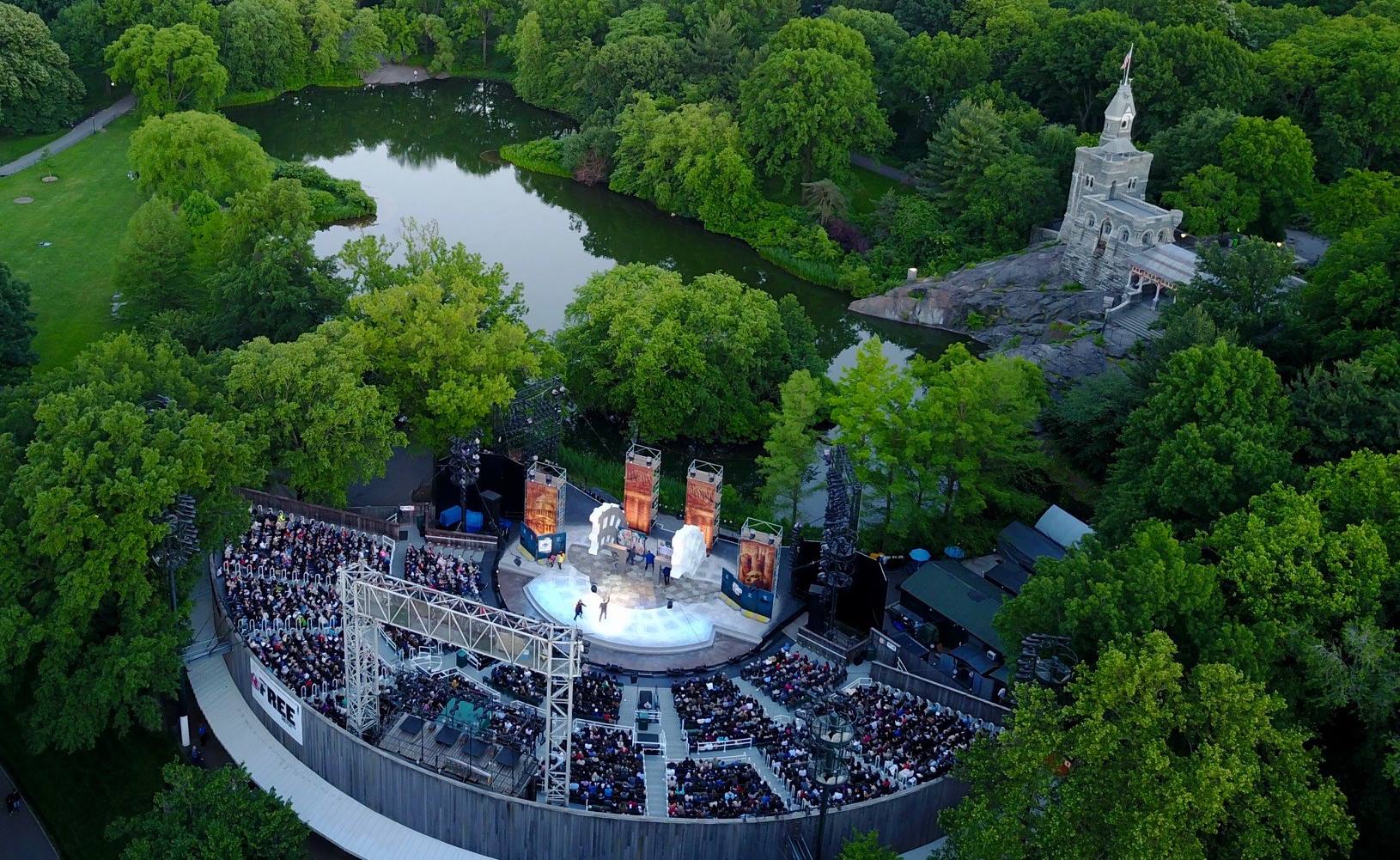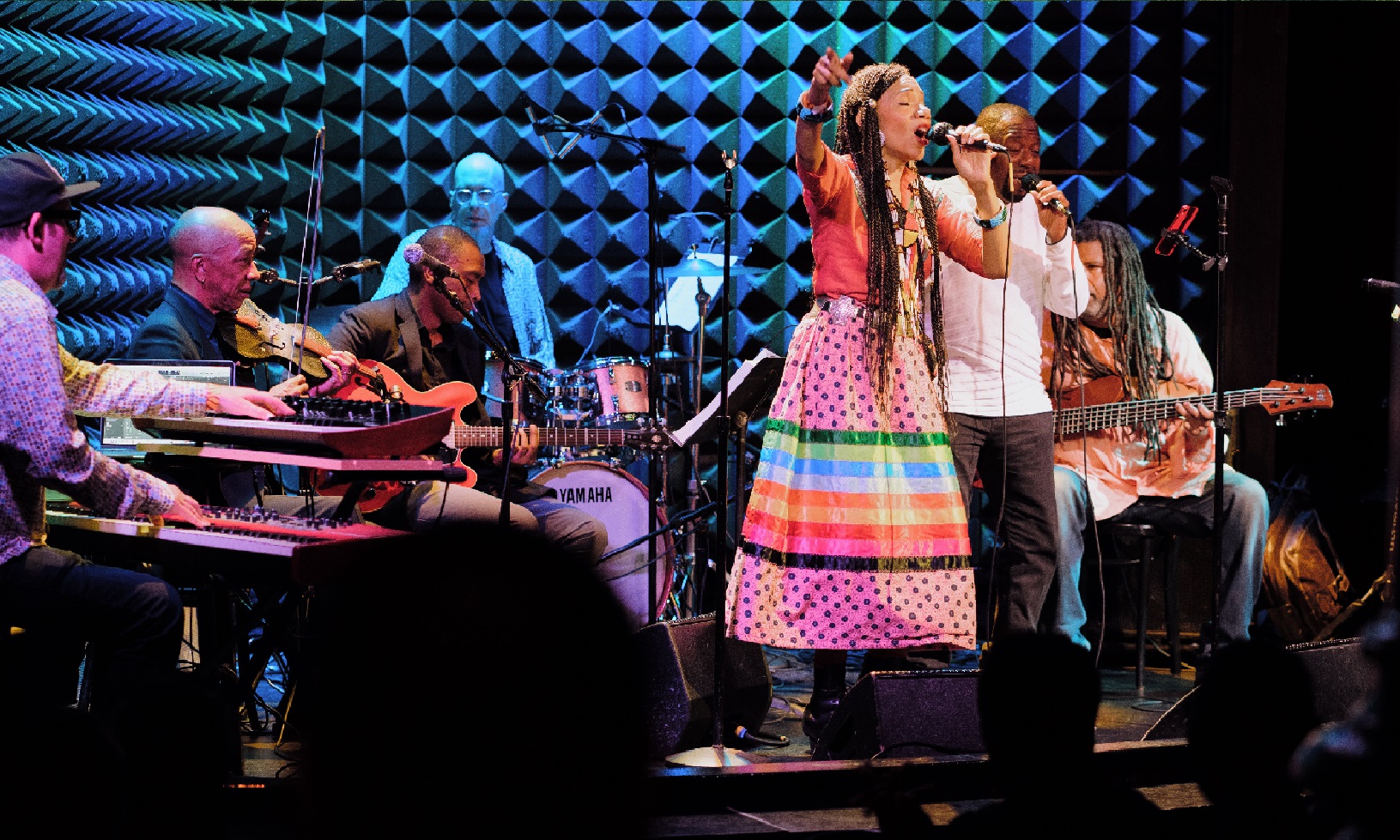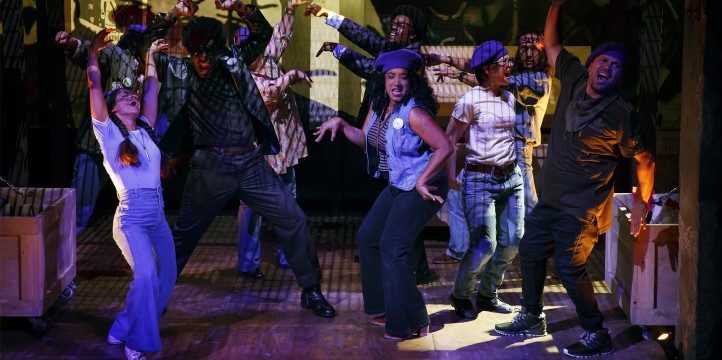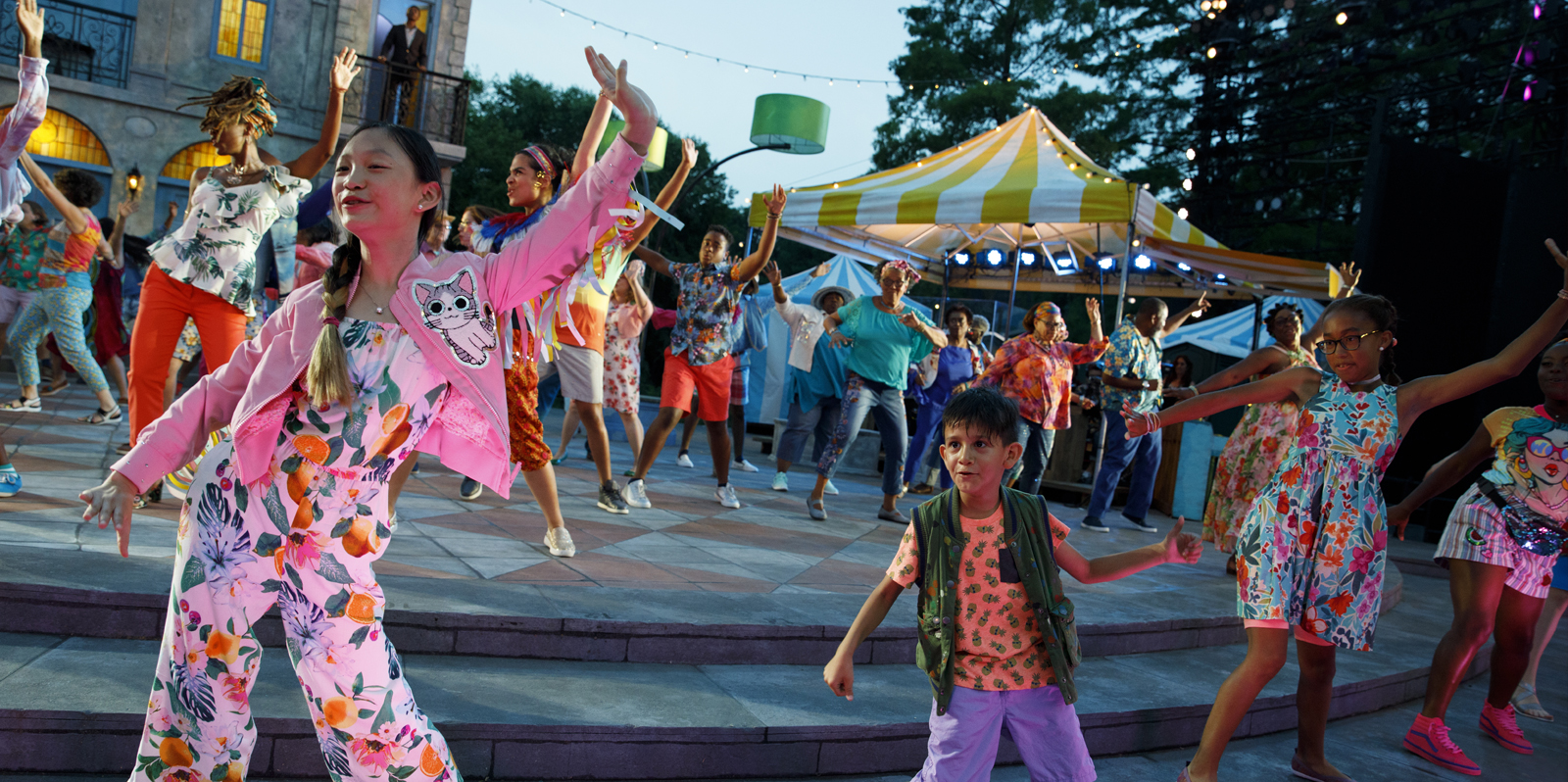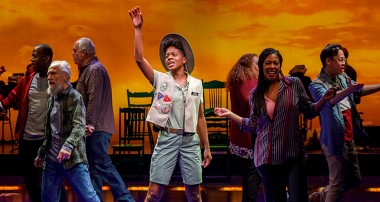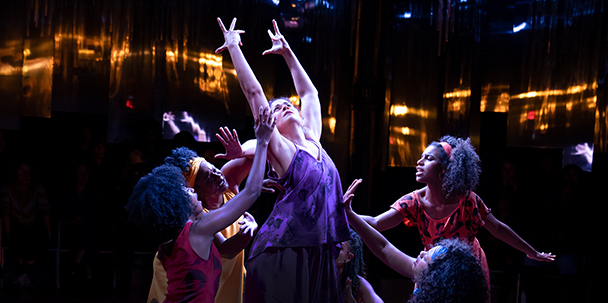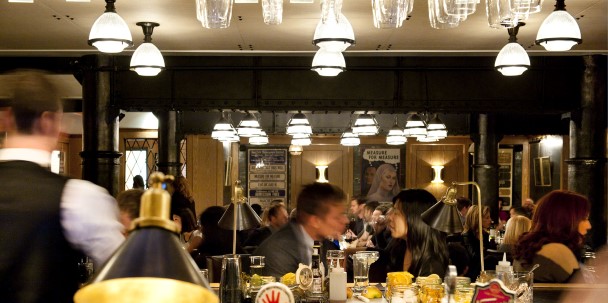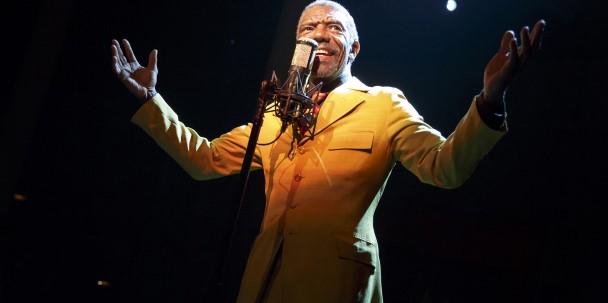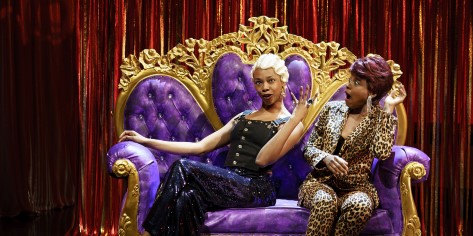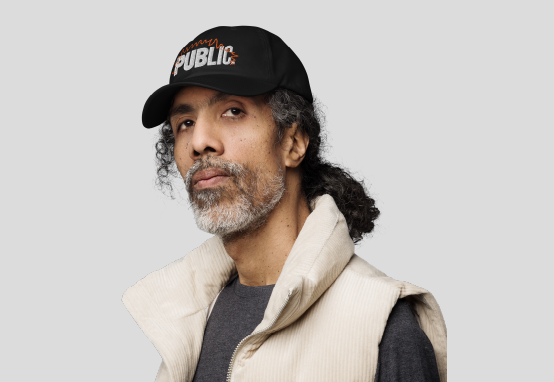[overlapping audio samples play over intro theme]
Kaleda Davis: If a library is free, why not a public theater?
Fernando Masterson: Theatre is a practice of—you know, it’s empathy, right? It’s—you’re watching something happen onstage—
Caity Joy Smith: Raccoons are very intelligent creatures.
Jeanine Tesori: Democracy and theatre, they have a deep relationship.
Jack Phillips Moore: The reason this is great is because it fundamentally understands what theatre is, which is, it’s a place for all of us to come together and appeal to something larger than ourselves.
Reynaldi Lindner Lolong: This is Public Square, a podcast of The Public Theatre.
RLL: Hi, my name is Reynaldi Lindner Lolong, Director of Digital Engagement here at The Public, and I co-host this podcast along with one of our Marketing Managers, Fernando Masterson. The world has changed a lot since we recorded the episode you’re about to hear. Our stages are currently dark, but we’re still here for you. We have a great lineup of digital programming, including live streams from Joe’s Pub, online recordings of shows, including our Shakespeare in the Park production of Much Ado About Nothing, and more, all of which you can check out at publictheater.org.
RLL: We are joined today by Jack Phillips Moore, Director of New Artists, and Jesse Cameron Alick, our Company Dramaturg, and they represent the New Works department here at The Public. Thank you both for joining us.
JPM: This is very exciting. Thanks for having us.
JCA: I got dressed up for you. Is that how this works?
RLL: Yes.
[laughter]
FM: Viewers at home, it is a beautiful ensemble.
JPM: Let’s just pack a lot of visual references into this podcast.
RLL: So I guess just to start us off, can you talk a little bit just about what is the scope of New Work at The Public Theater? And how do you two function in that department?
JCA: A question—a clarifying question. This is such a dramaturg thing to do. When we talk about asking about what is “New Work,” are we talking about what is the New Work department, or what is new work, period, at The Public? ‘Cause both questions are interesting to answer.
RLL: However the spirit moves you, so you should answer.
JPM: I would say that uh, what’s interesting about the New Work Development department, in terms of our charge here at The Public Theater, is that what we do is actually right there in our mission. The Public Theater’s mission is—or at least Joe’s founding principle, by the time the 425 Lafayette Street facility existed, was to take Shakespeare, the greatest writer in the history of the English language, and give him to the people of New York for free, and then also take stories from the people of New York and put those up on stages alongside William Shakespeare in the canon of American theatre. So we’re responsible for the latter half of that mission.
The Public Theater, other than Shakespeare, primarily does new plays and musicals, which means that we are concerned with almost everything we do on the Public Theater stages. What that means in brass-tax terms is that any time that we’re doing a new play or a new musical at The Public Theater, it has usually gone through a development process; that is, from the time a play or musical was an idea in an artist’s head, all the way up until opening, we are helping to encourage, shape, and challenge the artists to provide—to do their best work over that time period.
JCA: And I would just add that like, saying plays and musicals is definitely the majority of our scope, but you could—one could define new work at The Public Theater as also all the work that happens in Joe’s Pub, all the work that happens in the Under the Radar Festival, all the work that happens through the Mobile Unit, and in some ways our department does intersect and sneak into rooms around those projects also.
FM: So knowing all that, how do you personally intersect with the art? Or what is, like, your day-to-day look like when you go into work in the morning, as, you know, a director with new artists and with—as a company dramaturg, you know?
JPM: Well, I think the important thing to just say as sort of a preamble before we answer that question, is sort of talk a little bit about what a dramaturg does in general—
JCA: Mhmm. Absolutely.
JPM: —not just for The Public. And a dramaturg, there’s a lot of different definitions, um, but a new play dramaturg to us is essentially a champion and a midwife for a new play or musical or devised piece, whatever it is, and so our job is to identify extraordinary artists and extraordinary pieces of theatre, advocate for them to the artistic leadership of this organization, and then help that show, work with the artist in a sort of trusting partnership to help make that show the best version of itself that it can possibly be.
The reason I say that is that, the way to kind of coalesce all of that into a simple sound byte is: dramaturgy is about relationships between the dramaturg and the playwright. And so, how do we work with artists? It’s all about the relationships. So, there are relation—every single play and musical and theatre piece in general that finds its way to our stages has been helped, shepherded—has been shepherded along by a dramaturg, or in a lot of cases, several dramaturgs in its life at The Public.
We—our Artistic Director, Oskar Eustis, is a dramaturg by training; our Associate Artistic Director, Mandy Hackett, is a dramaturg by training; Jesse and I are dramaturgs by training. So the projects that actually find their way into The Public Theater’s pipeline are always, at the very beginning, about a relationship built on trust and imagination between an artist and a dramaturg at The Public Theater. I don’t know if that helps start to answer that question, but.
JCA: When I’m at dinner parties and people ask me what I do and I say “dramaturgy,” number one, they never know what it is—
JPM: Never.
JCA: —and if they know what it is, they think that dramaturgy is research—a research dramaturg, so it’s people who read lots of books and they figure out what kinds of socks they work in the 1800s, and then they make packets. And that’s not what Jack and I do; we don’t make packets. We could—we have made packets—
JPM: We do do some of them, yeah.
JCA: We have made packets and we are able to make packets, but that’s not the kind of dramaturgy we do at The Public Theater. We do new work development dramaturgy, which, the way that I often break it down is that we are story experts, that we are the best friend of the playwright, like we get drunk with writers a lot and we talk with them about their ideas, and we help their ideas grow. And we have different tools to help their ideas grow.
JPM: Yeah.
FM: So jumping off that, what does like, a day in the life look like, doing that here at The Public, you know?
JPM: I would say that, you know, in addition to having these relationships with artists, we are also the department that is charged with reading and seeing lots and lots and lots and lots and lots of plays and musicals, so on a given day, I’ll wake up in the morning and read a play; I try to read two plays a day. We get thousands of plays submitted to The Public Theater—that’s not to mention the plays that we are actively soliciting, plays that we’re hearing about from friends in the field, that kind of thing. So we’re spending a lot of our day reading; on a given night, we’re usually out at a show, whether that be a reading, a workshop, or a full production, or a Broadway show, god forbid. And then what we’re doing with our days is we’re having a lot of internal meetings about all of the different projects that we currently have in the pipeline.
We actually put a number to it in the last six months: we’re developing over a hundred—we have over a hundred projects at The Public Theater that are in some form of active development. That is, everything from a very small germ of an idea in a playwright’s head that we’re trying to suss out of their minds, to what’s happening on our main stage right now. That full spectrum is over a hundred pieces of theatre, so we’re making sure that we’re keeping all those plates spinning, we’re making sure that we’re checking in with artists about drafts that are due; we’re also meeting new artists, we’re seeing shows and reading plays and then trying to get to know those artists better, so we’re having get-to know-you meetings with artists.
FM: Wow.
JPM: We’re, you know, paying attention and preparing for all the various programs that we oversee: our Public Studio program, for example; the Emerging Writers Group, which Jesse and I co-run. All this stuff has a lot of, obviously, administrative work associated with it, but what’s kind of great about our jobs and—correct me if I’m wrong, Jesse—is that most of the time that we spend is in conversation with artists. It’s nice work if ya can get it.
JCA: Mhmm. Absolutely.
FM: And that is a busy inbox, lemme tell you. Hundreds of projects and—woof! Man. I didn’t even know that.
JPM [overlapping]: It’s a lot. And—and—and by the way, each one is—you know, no two shows are exactly alike; you can’t systematize after a certain point. All those relationships and projects are unique, so it’s not like, “Oh, you know, this project is in Step One, and then it’s going to go to Step Two.” You know, it’s all different types of things that are happening, so each project needs a different kind of support and attention. So keeping all that straight is also [laughs] where we spend a lot of our time and energy.
RLL: So how do you figure out what that support looks like? Like, Jesse, you had mentioned that when it comes to like, helping a story along, there are different tools that you use; what are an example of some of those tools?
JCA: Oh, gosh. We have all sorts of, um, different things that we need, and like, we use the word “bespoke” a lot at The Public Theater, which is a little bit annoying, but it’s true; we try and like, build the perfect box for the project, or like, give it exactly what it needs.
So those things that we have at our disposal include: commissions; we have a very robust readings and development process, where we do about a million readings and developments a year; we have artist residencies, artist retreats; we have the Emerging Writers Group; we have development programs like Public Lab, where it’s a workshop production; and then we have the tool that we use the most, which is conversations, which is literally—and then, you know, when you asked what we do on a daily basis, a lot of it is, we invite writers in and we talk to them. And we do a lot of talking.
And sometimes it’s talking big-picture about, “What are you interested in?” And a lot of the time it’s talking really, really specific, about like, “Hey, you sent me this draft of this play. I read it. Now we’re gonna talk about it.” And a lot of the work happens right there.
FM: Do you have advice for someone that might be working on a project, that wants to try to maybe get it here at The Public or get it anywhere? How do you take that idea and get someone to kind of buy into it? And what are, kind of, the next steps?
JPM: The only thing that I would say, that I know for sure, is that you can’t force it. Again, going back to this relationships thing, so I assume you’re talking about a writer or a composer or something—
FM: Mhmm. Yeah.
JPM: —who has their project. Um, if you have an agent, they know how to call us and say, “Hey, I got this client and they’ve got this show; would you sit down with them? Would you read it?” And the answer is always yes; we will always read something. And then what happens from there is, you know, if we think that the play is either really great or has potential to be great, and it feels like it’s in line with the mission of The Public Theater, then it will always go into, you know, the sort of consideration process, where it’s like, “Okay! You know, well, we all really like this piece; how can we help support it?”
And then that’s when Jesse takes out his toolbox, right? That’s when we get to the tools portion of it. It’s like, great! We have all these tools that are at our disposal and all these—we’re so blessed at The Public because we have all these programs, too, because we’re able to say, like, “Oh, we don’t just do straight plays and musicals; yeah, we have a music club in our lobby. You know, we do a festival of devised theatre every January.” So there’s all these different places we can also sort of set the trajectory toward. So yeah, but that first moment is about us coming into contact with a piece of theatre, whether it’s in a nascent stage or a more fully fleshed-out stage, and saying, “Oh yeah no, this is something I want to devote my attention to supporting.”
JCA: Um, if you’re going to be an interesting artist, you just have to be an interesting artist on your own. And how do you be an interesting artist? You live an interesting life. You—you run around town, you take advantage of New York City, you fall in love, you get your heart broken, and you go dancing. You live in strange places, you travel, I mean, you’re an interesting person, and that means that you will write interesting things. There are a lot of people out there who are technically very gifted and they don’t live interesting lives and therefore they don’t write interesting plays.
And in the end I think, The Public, Jack and I, maybe the entire theatre world, is interested in interesting plays. So I would say, that advice to that person, my first piece of advice was: be interesting. Live an interesting life. And then it’ll figure itself out.
[laughter]
FM: I love that.
JPM: The other thing I would say on that sort of “be interesting”—the other thing I would say is, if you’re a writer and you’re trying to—you know, you want advice about how to get notice in the field, how to write a really good play, always starts with this thing I always ask when I meet a writer for the first time, is: What keeps you up at night? What is the thing that drives you crazy? What is the thing that you’re thinking about all the time, that it either makes you mad, makes you deeply curious; what is that thing that is just grinding at your organs? That’s what you should be writing about, because if you’re following that passion for it—don’t write what you think you should write about, in some intellectual way, like, Oh, I should write about that thing that’s in the headlines, because that’s super interesting. Maybe, but the thing that’s gonna be great is gonna be something that just is trying to leap its way out of your chest. That’s when you take your pen out or your word processor and that’s—that’s always gonna yield something interesting.
RLL: I’m trying to decide if I want the episode title to be “Be Interesting.” or “What Keeps You Up at Night?”
JCA: Oooooh. That’s sexy. See? I would read that play.
JPM: And I think you can like, point to any project we’ve done at The Public Theater and I can tell you what kept that artist up at night, that made them write that play. You know, that’s—that’s what we’re all excited by. And then if you have—and then it’s just reaching into your toolbox and saying, “All right, how do I get this out of me? How do I get this on paper?”
And then that is where we come in; we can help you. As a dramaturg, we can be that first audience member, that sounding board. You know, I have playwrights who call me late at night and will be like, “Hey, I just had this idea; what do you think of this?” And, you know, I can be like, “I think this” or “I think that.” More often than not, I will—as Jesse did at the top of this episode—ask a question back: “Well, what does it mean to you? What do you—what is interesting to you about it?” Um.
JCA: That’s an old dramaturg trick. They ask you a question, you’re like, “Well, what do you think?”
[laughter]
JPM: A lot like therapy in that way.
JCA: Makes you sound smart.
JPM: “Tell me more about that. Why do you think that happened in your dream? Yeah? Why do you think you were being chased by elephants in your nightmare?”
RLL: We’ve talked a lot about New Work and kind of coming from the angle of new writers. Does it always begin with a writer?
JPM: It usually starts with an artist. But sometimes that artist isn’t a playwright; it’s a director.
JCA: Yes.
JPM: And it’s a director who has an idea and says, “Oh, gosh, I want to build a team around me to help with this idea.” Um, you know, in theatre as much as anything else—any other performing art—there are source materials that are picked up, like for example, a story about one—a show that we’ve done in recent seasons, Tiny Beautiful Things, that Nia Vardalos wrote, Tommy Kail directed. That started when Tommy Kail had Cheryl Strayed’s incredible book, Tiny Beautiful Things, and started passing it around, and Oskar Eustis was one of those people that read it, and immediately there was this, how do we make this into a, you know, a show? There was—it didn’t start with like, a script adaptation; it was like, this book is incredible—can we theatricalize it?
And when the answer was yes, it was, okay, so how do we do that now? And it took some doing. It took a lot of readings and a lot of developments to figure out, oh, this is how you theatricalize a bookful that is of—that is just of letters to an editor, basically. So there’s a million ways you can do it, and part of what’s exciting is that that first impulse you have about a project, wherever that first impulse came from, that tends to dictate how the show gets made. Um, and of course we know artists who make things, you know, there are devised theatre companies that devise things together as a cohort through improvisation, through writing, through collaborative storytelling. There’s all sorts of ways that people start a project.
JCA [overlapping]: We live in a time of hyphenate artists, also. Um, no longer is just a playwright just a playwright, but you have playwright/director/actor/deviser and these people—so like, really, the creator—there’s typically a creator or a number of creators, but sometimes you can’t actually box them in, in terms of calling them playwrights or directors or whatever.
JPM: And sometimes you can actually restrict a creative process by adhering to those labels, actually. To take it back to dramaturgy, one thing I want to make sure I say in this episode is that dramaturgy is not an identity; dramaturgy’s an action. You don’t have to be a self-described dramaturg in a rehearsal room in order for a show to have dramaturgical conversations. A lighting designer can be a drama—can contribute dramaturgically to a show, and an assistant director can.
JCA: And oftentimes they do.
JPM: Actors are often some of the best dramaturgs, because they live in their parts in ways that the writers who created those parts could never imagine.
FM: Jay Duckworth is a dramaturg.
JPM: Are you kidding me?
FM: He gave us a whole rundown—
JPM: Jay Duckworth is a dramaturg—every designer you’ve ever met. You know, one of the smartest dramaturgs in the country, I always say this whenever I have a platform, is a lighting designer named Kate McGee; I think she is one of the smartest dramaturgs I’ve ever met—she’s a lighting designer. Um, so that’s something that it’s not like—if you want to be a dramaturg, you don’t have to go to dramaturgy school, you know, clearly. Just look at Jesse and I.
[laughter]
JPM: But you can—dramaturgy’s an action that you can practice in rehearsal room from the vantage point of whatever your role in the room is, just to say.
JCA: I absolutely love this turn of phrase, “dramaturgy is an action.” It’s like how love is an action, or trust is an action, but dramaturgy is an action—
JPM: I love a soundbyte.
JCA: —because the way—I know, it’s a beautiful soundbyte—the way that I often talk about dramaturgy is a road trip, and the playwright or creator is driving the car, and the dramaturg is the passenger. And the creator is driving, y’know, I’m just sitting along for the ride, and we’re driving somewhere and they’re like, “We’re going to Cleveland,” and I’m just along for the ride. But I have eyes and ears and my phone that has Google maps, and I might look and be like, “Oh, you said we were going to Cleveland, but it looks like we’re going to Cincinnati—is that where you want to go? Do you want to go to Cincinnati? Because we can just keep on going to Cincinnati, but if you want to go to Cleveland, we might take this other road.” But like, it is only the job to guide and reflect back in dramaturgy. You don’t own the play; it’s not your play. It is the creator’s play.
FM: So, knowing all of that, when do you kind of know that you’ve succeeded in your—in your work? I imagine that your success—the playwright’s success or the creative team’s success is your success, but you know, on the Marketing side we have a lot of KPI, you know, Key Performing Indicators that tell us, oh, we did our job! When do you know that you’ve done your job? When do you—when can you pat yourself on the back?
JCA: That’s sounds amazing to have— [inaudible]
[laughter]
FM: It’s not that easy, but—
JCA[overlapping]: Have like an indicator that you’ve done a good job.
JCA: How do you know, Jack?
JPM: I mean, the most—I’m just trying to think of times when I’ve felt the best while committing acts of dramaturgy.
[more laughter]
FM: Examples are wonderful.
JPM: When I—when I know that I have done something that has helped an artist fall more in love with their play, with their own work, that is the best feeling in the world. Because, you know, dramaturgy, there’s—we talk a lot about like, giving notes. Like, we’ll go to a reading of a new play and then we’ll sit around, we give notes about “oh, maybe try this or try that” or “this doesn’t quite work for me yet,” but if you can activate—and that’s you telling a playwright what you think they should be focusing on, and that can be often very useful, but the best notes are ones where you are—as a dramaturg, you are helping create circumstances in the creative process by which the generative artist, the playwright for example, can realize something of their play that they never saw before.
JCA: Yes.
JPM: And it’s almost like being like, a—sorry, you’re sitting with two dramaturgs, you’re gonna get a lot of metaphors in this hour, ‘cause that’s just what we deal in every day—but it is, it’s like being a therapist or a personal trainer, y’know. It’s—a personal trainer teaches you, no, you actually can do those extra fifteen push-ups; you didn’t think you can—you don’t think you can, but you can. And as part of—I think some of my favorite moments of doing dramaturgy are moments like that, where the playwright suddenly goes, oh my god, I can actually do fifteen more push-ups!
JCA: I feel the same way, Jack, because one could say, oh, success looks like a production or success looks like, you know, everyone clapping really hard or something, but that actually doesn’t—that’s not what success feels like as a dramaturg. Success feels like when you have, and you are participant. and you bring to the table an epiphany. Like, you’re talking to a writer and you give a note, and that note suddenly explodes, and it explodes into a field of flowers and you can see in the playwright’s eyes, oh my god, you’ve helped me realize something, I have to get out of this room so I can rewrite my play. That’s when I know. oh my god—you know, that’s when I’m patting myself on the back, when I give an amazing note that leads to epiphany.
[laughter]
JPM: But you don’t—you don’t go into dramaturgy for credit. I mean, it may sound like false modesty—
JCA: That’s the truth. No, it’s the truth, is what it is.
[laughter continues]
JPM: Because again, we don’t own anything. Like, it’s—we’re—our names are not in Playbills.
JCA: And we rarely get credit.
JPM: We rarely do. And, uh, there’s—there’s movements afoot that are trying to change that.
JCA: Mmmmh.
JPM: But I think that we are—our occupation is one of service, not of accomplishment, so it’s—we don’t get medals for our work, we don’t get Tony awards or Obie awards; playwrights do. And I’m for one deeply fine with that, because it allows you to recognize that your job is in—not just made better by humility, but is rooted in humility. It has to be in service of something larger than yourself. It has to be in service to a play—not what you egotistically think a play should be, or “if I were writing it, that’s what I would do with Scene II,” no, that is a one-way train trip to making a play bad. It’s about what does this playwright, what does this process need from me right now? Sometimes that answer is silence and getting out of the way.
JCA: Sometimes the—the answer to that is that the playwright needs to talk about their recent breakup and cry for a little while, because if they don’t do that they can’t get to the rewrite.
JPM: Of course.
JCA: Um, like again, what Jack said, relationship—like, a dramaturg is someone who doesn’t have a job in the room; everyone else in the rehearsal room has a job. You know, the stage manager has to stage manage, the actors act, you know, and the directors to direct, but like, the dramaturg, you know, you kind of don’t know what their job is exactly. And that’s good for someone, that means they can flow like water into places that the need— Sometimes in rehearsal room, you are sitting right next to the playwright; sometimes in rehearsal room, you’re sitting right next to the director; sometimes you’re sitting in the back and you’re not sitting next to anyone. And it’s useful to have that kind of person that can flow to different places.
JPM: Yeah.
FM: I have to ask, just because you’re taking in so much theatre and you get kind of a—I mean, of course, you see so much of it in its developmental work and even you read so much of it before it even gets developed: where do you see the future of theatre going?
JCA: Oh god.
FM: I mean, do you see a trend? I—you know, I love what you said earlier, Jesse, about y’know, we all have these shared experiences, at least in this society, in this community. So when we see stories, you know, part of what we love about them is we can relate to them sometimes, and what we love about other stories is we can’t relate to them and we speculate, right? Wh-what do we, where do we see the shared experiences going? Or is that going away? Wh-where is the future? What is the future? [dramatic pause] You have sixty seconds.
[laughter]
JPM: This is such—this is a very interesting question, to try and predict the future of the American theatre. Um, I—I’m not quite sure that I can do this, but what I will say is that the theatre isn’t going anywhere. People crave more now being in spaces with each other, and so our profession is safe, y’all. You know? We’re all good. Bye, house. But um, but I will say that in terms of the way that people are working, I will say that as we move into the future, people will have more skills, and people are able to have access to more information and the ability to create things more.
What I have seen is that, once upon a time, the most groundbreaking work happened at the big theaters, and I don’t think that that’s true anymore. I think that you can have a play at any sort of small or midsize theater, and it can become the most popular thing in New York City. We live in a world where people travel, and ideas travel, and I think that’s a good thing.
JPM: You know, and theatre’s also, at its fundamental core, it’s a tool—it’s a technology, and what you do with it is sort of infinite. I mean, you can always find new ways to use it, activate it, put charge into a story. And so I’m—I have no idea what the future of theatre is, but I know it’s exciting, and I know that, y’know, I believe the children are the future. I wanna just coin that phrase. I feel—
[laughter]
JPM: No, I think that each generation has something new to say and new things to rebel against. And um, y’know, what was once revolutionary becomes status quo, and then a new revolution must begin, and—and nothing dies, but everything constantly is in conversation with each other. That’s what I—the only hope we have for American theatre is if we’re constantly in dialogue with each other and riffing off of each other’s “oh, I see what you did there, I really like that”—being inspired by each other. That’s the other thing I would say to like, artists who are trying to figure out how to have a career in this crazy business, is: support each other, and hold each other up and vouch for each other, because you’re all going to come up together.
This is a, at the end of the day, a community, and the more you can be in community, the better off you’re going to be. The future I think is gonna be great. I mean, like, there’s trends and stuff we can talk about, but um—I mean like, to that whole thing about theatre being ancient and—you know, theatre is also, in addition to being a technology, it’s a ritual. We’re very, very close to religion in how we operate and in how we tell stories and how we bring people together. And so what I’m intere—one trend I’ve seen recently that I’m super interested in is people explicitly poking at theatre’s ability to be ritual.
I think about something like What to Send Up When It Goes Down, which we were lucky enough to host here at the Under the Radar Festival this year, which is a play that is, is a ritual. It is a ritual cleansing, it’s a ritual airing of feeling and airing of truth, and I was like, “This is—the reason this is great is because it fundamentally understands what theatre is,” which is: it’s a place for us all to come together and appeal to something larger than ourselves.
RLL: Public Square is produced and hosted by Reynaldi Lindner Lolong and Fernando Masterson. This episode’s guests were Jack Moore and Jesse Alick. The music in this episode is by Michael Friedman. To learn more about The Public Theater, visit publictheater.org.

